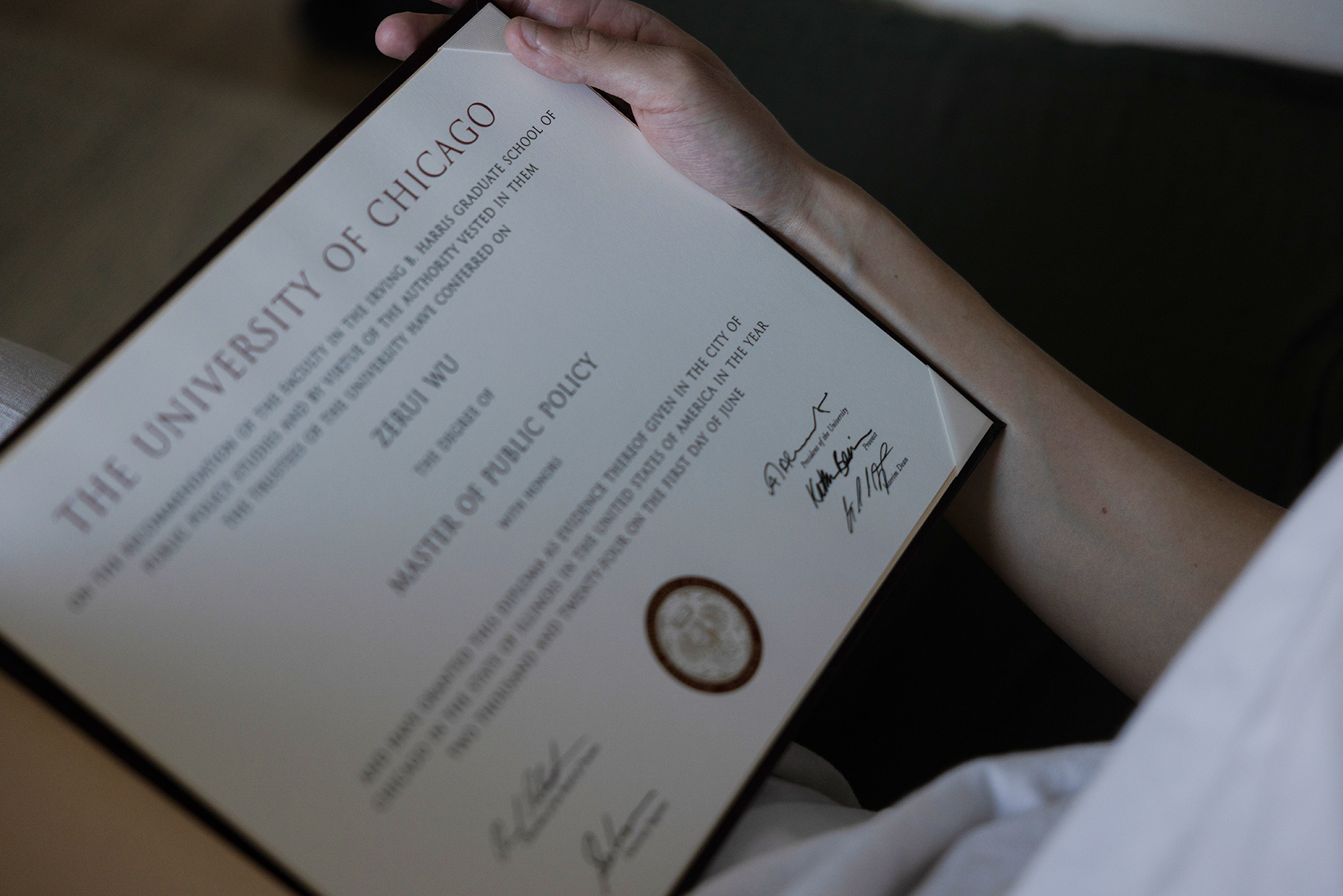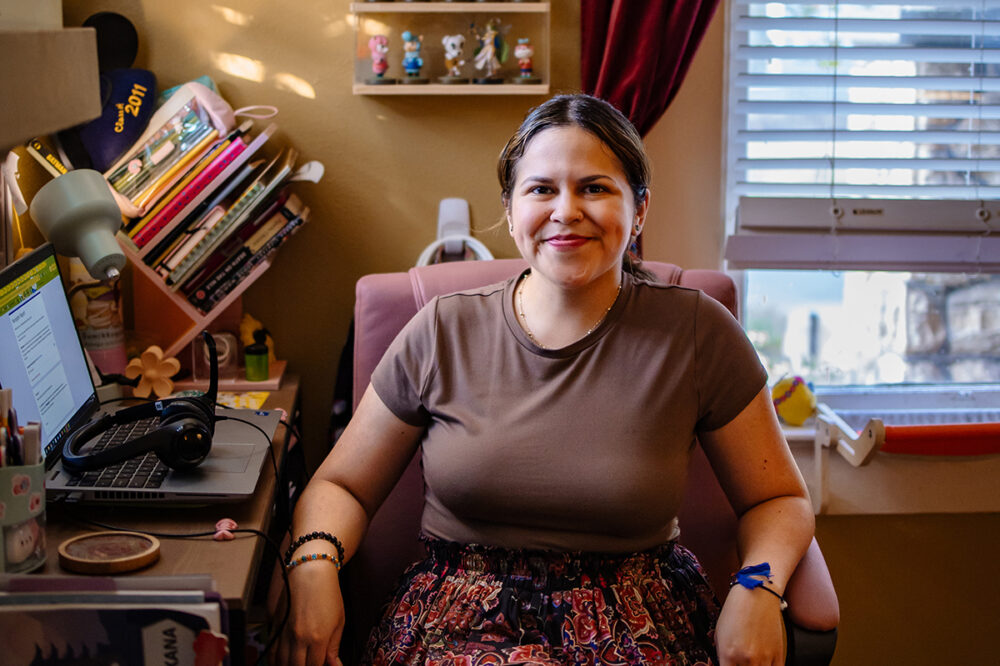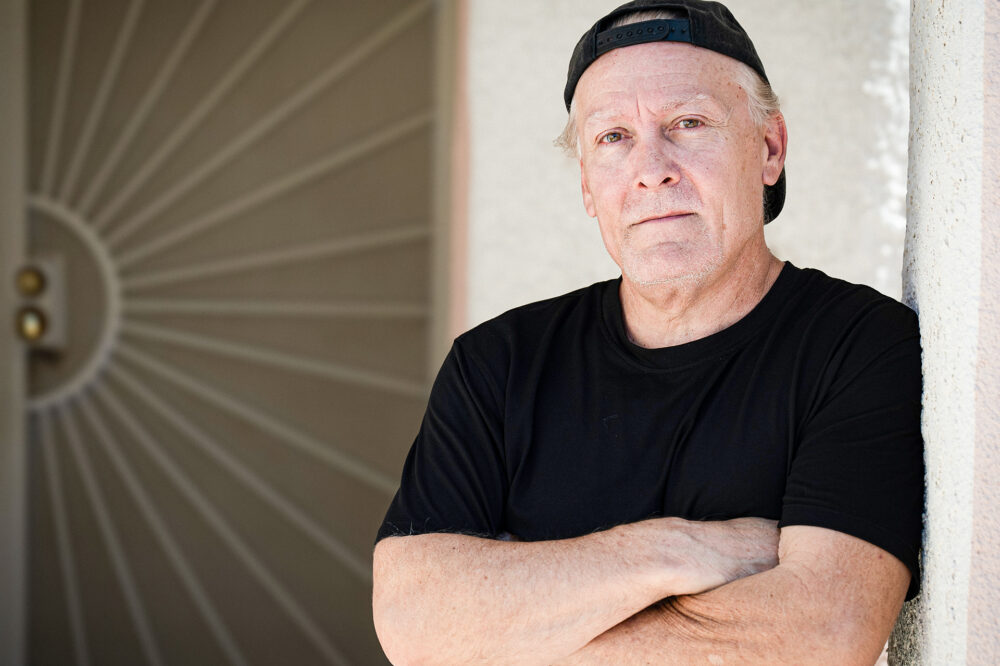600 Job Applications, No Offers: Zerui’s Story
After earning his master’s with honors last year, Zerui is getting by on low-wage work while he continues to apply for jobs. Still, he remains hopeful.
By Financial Health Network
-
Category:
-
Tags:

Zerui Wu, 27, moved from Southeast China to the U.S. to pursue his longtime dream of becoming a professor. His parents paid more than $200,000 for him to attend a selective master’s program, using a combination of loans and savings to cover the costs. Two years later, Zerui’s dream has yet to come to fruition.
Today, Zerui earns close to minimum wage working as a data analyst in Washington, D.C. He also works remotely as a part-time unpaid research assistant to keep his experience up to date.
He’s applied to more than 600 job openings to get back into academia without success. Most nights he’s up until at least 1 a.m., working or sorting through job leads.

Zerui, who moved to the Washington DC area two years ago and shares a studio with his girlfriend, works full-time as a data analyst and spends his free time doing unpaid academic research.
Zerui is one of many members of Generation Z grappling with a new financial reality as faith in the American Dream declines. Financial Health Network research shows that the percentage of younger people doing as well as their parents has been dropping for decades. While data suggests that education is still the best path to wage growth, Zerui’s experience demonstrates that this is not always the case – at least not right away. The ROI of an advanced degree is growing more shaky across many fields, including academia. Financial Health Network research shows that people working in non-traditional jobs, including contract roles like Zerui, are also less financially healthy than those working in traditional W2 roles – making even basics feel like a luxury.
While Zerui remains hopeful his dream job is out there and continues to take on research opportunities in academia, making ends meet is a daily challenge. Right now, he’s sharing a studio apartment with his girlfriend in Arlington, Virginia. But even with splitting expenses, it’s hard to stay afloat financially.
Here’s his story.
When I was studying in China, I knew I eventually wanted to come to the U.S. My initial major was marine physics, but after spending three months volunteering with underprivileged children during my undergraduate study, I changed my mind. My focus went from technology to English and the social sciences. I majored in English literature to improve my English, because it was not so good before. I came to the University of Chicago for my master’s program in 2022. After I graduated in 2024, I moved to Washington, D.C., with my girlfriend.
-
Zerui estimates that he has applied—and been rejected from-–more than 600 academic jobs in the last year.

My goal remains the same: to find work in academia. I’m not a very vocal person, but every time people ask me about my research, I can talk nonstop. I want to help people through my research on wealth inequality, poverty, and economic growth, and academia is a path for that. This is one of my passions and I want to continue to pursue my purpose.
I have to sustain my life, because the research jobs to continue my career are unpaid. Right now, I work 9 to 5 as a data analyst and earn $19.50 per hour, just $2 above the minimum wage here in D.C. They just fired my supervisor a month ago, and my workload increased exponentially. So now I’m juggling this job while still looking for a new opportunity to get into academia in the future.
“I’ve been looking for a job in academia for a year, and I’ve sent in about 600 job applications.”
When I come home, I do my research or apply for jobs until 1 or 2 a.m. I’ve been looking for a job in academia for a year, and I’ve sent in about 600 job applications. At first, I was pretty surprised, but now I just got used to it. That’s the norm, so every rejection letter makes me less sad now. I just apply again. Right now, I’m not very happy. But I know that I can be happy in the long term if I can become a professor and really help people with my knowledge.
My monthly wage is $2,200. I spend half of that on our studio rental, and the rest basically goes to groceries. We live outside of D.C. in Arlington, Va., because it’s more affordable. Still, there’s nothing left for the month. I don’t have any savings, and I also don’t have health insurance because I don’t have enough to buy that.
-
After arriving from China to fulfill a lifelong dream of studying in the U.S., Zerui has yet to find work in academia.

-
Zerui’s parents, who live in China, took on roughly $200,000 in debt to pay for his master’s degree in the U.S.

-
Despite sharing a small studio in Arlington, Va. there’s nothing leftover after paying for groceries, rent and utilities, Zerui says.

I have no idea what I can do, because I don’t even have any savings. I don’t actually see a month that I can have extra money that can go toward saving or building some credit or something. Right now, I don’t feel like I have a plan.
Even networking takes money. Often, I don’t think I have the money to do that because I have to buy a drink, or I have to buy very decent attire. Still, there’s a real benefit to networking, especially when you’re starting out and don’t have a large network – I try to do this whenever possible.
“I don’t actually see a month that I can have extra money that can go towards saving or building some credit or something. Right now, I don’t feel like I have a plan.”
My parents took loans to pay for my education and don’t expect me to return this money. They just want me to keep pursuing my dreams. It was around $200,000. They’re still paying the loans and are just cutting down on their own expenses. My mom can’t even buy new clothes.
People have very high expectations that if you went to a prestigious school, you can find work and do whatever you like. I graduated with honors and took challenging Ph.D.-level classes and math classes, but still cannot get into a Ph.D. program. Even with my advanced degree, jobs are scarce. And the support of staff and professors drops off when it comes to career development. They just care about how well you performed in school.
-
As Zerui searches for work in his field, his parents in China are living frugally while continuing to pay off his college debt.

-
Most nights Zerui stays up until 1 a.m. fielding job leads.

Zerui is one of many young people in America making serious financial tradeoffs as they enter the labor force. Research shows that many graduates are entering the job market with high levels of student debt, making it challenging to save or invest. Others find themselves experiencing “credential inflation” with higher requirements even for entry-level jobs, especially in fields with low hiring rates, including education.
Additionally, Zerui is one of 58% of Gen Z members who are rent-burdened, spending more than 50% of his monthly income on rent and utilities. For many in his generation, these factors are contributing to growing pessimism around attaining the American dream.
Without systemic solutions for these challenges, Gen Z graduates will fall even farther behind financially. For now, Zerui remains optimistic and continues to push for a job in his field, but with so much uncertainty, stories like his may become the norm. Policymakers need to offer targeted support to help this generation succeed. This means easing entry into the labor market, managing the cost of living along with the burden of student debt, and supporting a strong financial foundation that includes savings.
Share Your Story With Us
Our Human Stories spotlight the real-life experiences of people navigating disaster recovery, disability, career transitions, multigenerational living, and more – bringing fresh urgency to the financial challenges facing Americans today. Have a story to share? We’d love to hear from you.
Read More Human Stories
From Poverty to a College Degree: Angel’s Story
Without a financial safety net, one college graduate’s journey to a diploma was paved with setbacks and plenty of resolve.
Still Striving for Financial Independence: Becky’s Story
Entering adulthood has come with ‘curveballs’ that her parents never faced, and an increasingly uneven playing field to catch up.
Rebuilding Without Renters Insurance: Rob’s Story
After a movie-like getaway, Rob lost his car, home, and work equipment to the LA wildfires. Weeks later, another family tragedy hit.
Related Research
Financial Health Runs in the Family: Intergenerational Trends and Opportunities
Family members don’t live in silos, and financial health solutions can’t, either. How can we take a holistic approach to meet every generation’s needs?
Pulse Points: Main Gig or Side Hustle? Nontraditional Work and Financial Health
More than 1 in 10 working adults holds a nontraditional job. How is this growing and diverse sector of the American economy faring financially?




